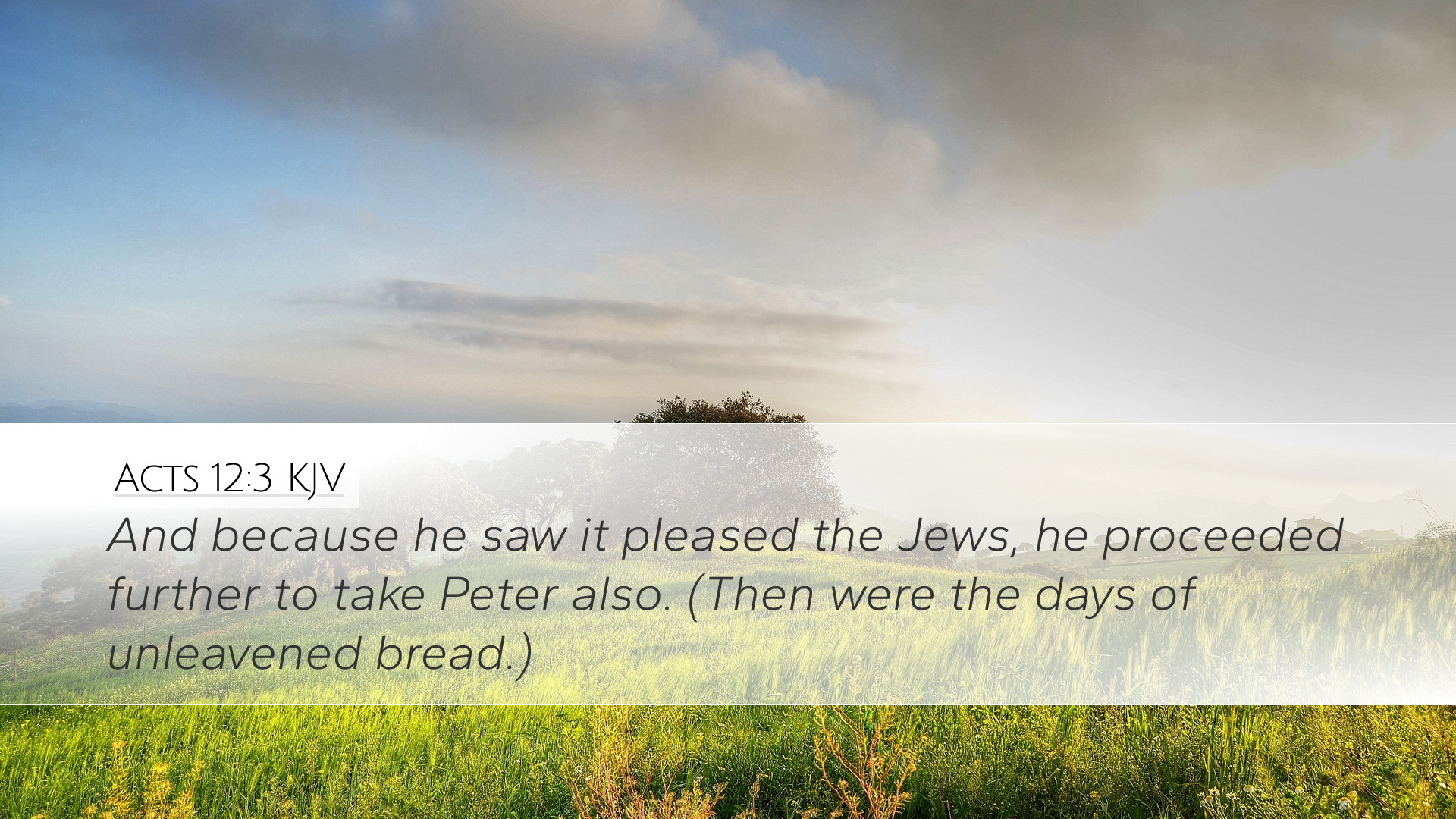Old Testament
Genesis Exodus Leviticus Numbers Deuteronomy Joshua Judges Ruth 1 Samuel 2 Samuel 1 Kings 2 Kings 1 Chronicles 2 Chronicles Ezra Nehemiah Esther Job Psalms Proverbs Ecclesiastes Song of Solomon Isaiah Jeremiah Lamentations Ezekiel Daniel Hosea Joel Amos Obadiah Jonah Micah Nahum Habakkuk Zephaniah Haggai Zechariah MalachiActs 12:3
Acts 12:3 KJV
And because he saw it pleased the Jews, he proceeded further to take Peter also. (Then were the days of unleavened bread.)
Acts 12:3 Bible Commentary
Commentary on Acts 12:3
Verse Context: Acts 12:3 states, "And when he saw that it pleased the Jews, he proceeded further to take Peter also. Then were the days of unleavened bread." This moment occurs in the broader narrative of the early church facing persecution and illustrates a pivotal moment in the life of the Apostle Peter, as well as the political dynamics of the time.
Historical Background
This verse is set against the backdrop of Herod Agrippa I's reign, who sought to consolidate his power and gain favor with the Jewish population. The mention of the Feast of Unleavened Bread highlights the Jewish calendar and indicates the significance of timing in these events.
Commentary Insights
-
Matthew Henry: Henry emphasizes that Herod's actions were politically motivated, illustrating the theme of persecution. He notes that Herod, seeing the reaction of the people with favor towards the persecution of Christians, capitalized on that sentiment to further his agenda. This serves as a reminder of the political and social influences that often intersect with faith, leading to conflicts.
-
Albert Barnes: Barnes focuses on the spiritual implications of this verse, commenting on the contrasting attitudes within the early church. He notes that the persecution of Peter was not merely an attack on an individual but a systemic attempt to suppress the growing Christian faith. Barnes also highlights the faith and resilience of the early believers in the face of adversity, encouraging readers to hold firm in their convictions.
-
Adam Clarke: Clarke provides a linguistic analysis of the text, noting the phrase "when he saw that it pleased the Jews" reflects not only Herod's desire to gain popularity but also the precarious position of the early church. Through this commentary, Clarke points to the broader spiritual and moral ramifications of political power used in opposition to the gospel. He warns against the dangers of aligning faith too closely with political entities.
Theological Themes
This verse incorporates several significant theological themes that resonate with pastors, students, theologians, and Bible scholars:
- Persecution: The episode illustrates the reality of persecution that the early church faced. This serves as a testament to the foundational belief that Christians might endure suffering for their faith, echoing the teachings of Jesus regarding the cost of discipleship.
- The Sovereignty of God: Despite the dire circumstances, God's control over the situation is evident. This narrative reassures believers that even amidst hostility, God's plans and purposes cannot be thwarted.
- The Church’s Response: How the church reacts to persecution is vital. Acts 12 later depicts the prayerfulness of the Christian community, suggesting that in times of trouble, reliance on prayer and community is paramount.
- Political Dynamics: The interplay between religious and political spheres presents a reminder for contemporary theologians about the influence of governmental powers on faith communities. This interaction urges a reflective examination of the priorities that should guide ministry in these contexts.
Practical Applications
In light of Acts 12:3, several practical applications emerge for modern believers:
- Enduring Faith: Believers are encouraged to maintain steadfastness in their faith, even when faced with opposition. The early church’s response to persecution demonstrates the strength and unity found in community and prayer.
- Courage in Adversity: Just as Peter faced imprisonment, modern believers should seek courage to uphold their faith in challenging circumstances, culturing resilience and commitment through practices such as prayer and reading Scripture.
- Awareness of Cultural Influences: Understanding the political and social dynamics at play in their own context can help believers navigate their faith in a world often hostile to gospel truths, emphasizing the importance of discernment and wisdom.
- Importance of Unity: The need for unity within the body of Christ is reinforced. The communal support in prayer during periods of tribulation strengthens not only individual believers but the church as a whole.
Conclusion
Acts 12:3 serves as a poignant reminder of the historical realities of the early church's struggles, the complexities of faith amid political challenges, and the unwavering sovereignty of God. Commentaries such as those by Matthew Henry, Albert Barnes, and Adam Clarke provide rich theological insights that continue to challenge and exhort modern believers to live out their faith with courage, commitment, and a keen awareness of the spiritual battles that persist. The ongoing quest for understanding within this passage invites scholars and practitioners alike to explore the deep implications of persecution and the vital nature of prayer and community in maintaining faith in the face of adversity.


